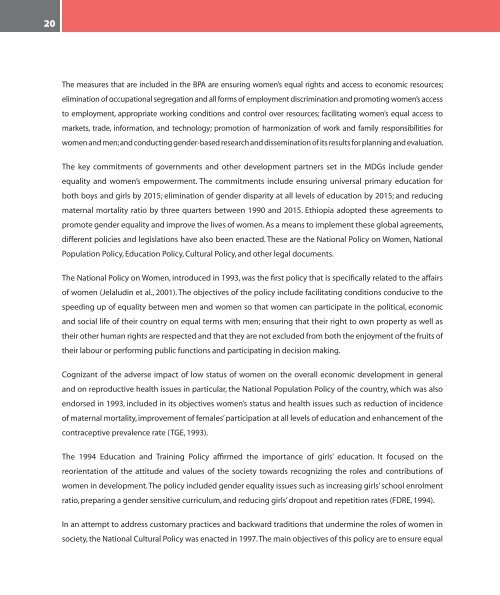Gender Inequality and Women's Empowerment - UNFPA Ethiopia
Gender Inequality and Women's Empowerment - UNFPA Ethiopia
Gender Inequality and Women's Empowerment - UNFPA Ethiopia
Create successful ePaper yourself
Turn your PDF publications into a flip-book with our unique Google optimized e-Paper software.
20<br />
In-depth Analysis of the <strong>Ethiopia</strong>n Demographic <strong>and</strong> Health Survey 2005<br />
The measures that are included in the BPA are ensuring women’s equal rights <strong>and</strong> access to economic resources;<br />
elimination of occupational segregation <strong>and</strong> all forms of employment discrimination <strong>and</strong> promoting women’s access<br />
to employment, appropriate working conditions <strong>and</strong> control over resources; facilitating women’s equal access to<br />
markets, trade, information, <strong>and</strong> technology; promotion of harmonization of work <strong>and</strong> family responsibilities for<br />
women <strong>and</strong> men; <strong>and</strong> conducting gender-based research <strong>and</strong> dissemination of its results for planning <strong>and</strong> evaluation.<br />
The key commitments of governments <strong>and</strong> other development partners set in the MDGs include gender<br />
equality <strong>and</strong> women’s empowerment. The commitments include ensuring universal primary education for<br />
both boys <strong>and</strong> girls by 2015; elimination of gender disparity at all levels of education by 2015; <strong>and</strong> reducing<br />
maternal mortality ratio by three quarters between 1990 <strong>and</strong> 2015. <strong>Ethiopia</strong> adopted these agreements to<br />
promote gender equality <strong>and</strong> improve the lives of women. As a means to implement these global agreements,<br />
different policies <strong>and</strong> legislations have also been enacted. These are the National Policy on Women, National<br />
Population Policy, Education Policy, Cultural Policy, <strong>and</strong> other legal documents.<br />
The National Policy on Women, introduced in 1993, was the first policy that is specifically related to the affairs<br />
of women (Jelaludin et al., 2001). The objectives of the policy include facilitating conditions conducive to the<br />
speeding up of equality between men <strong>and</strong> women so that women can participate in the political, economic<br />
<strong>and</strong> social life of their country on equal terms with men; ensuring that their right to own property as well as<br />
their other human rights are respected <strong>and</strong> that they are not excluded from both the enjoyment of the fruits of<br />
their labour or performing public functions <strong>and</strong> participating in decision making.<br />
Cognizant of the adverse impact of low status of women on the overall economic development in general<br />
<strong>and</strong> on reproductive health issues in particular, the National Population Policy of the country, which was also<br />
endorsed in 1993, included in its objectives women’s status <strong>and</strong> health issues such as reduction of incidence<br />
of maternal mortality, improvement of females’ participation at all levels of education <strong>and</strong> enhancement of the<br />
contraceptive prevalence rate (TGE, 1993).<br />
The 1994 Education <strong>and</strong> Training Policy affirmed the importance of girls’ education. It focused on the<br />
reorientation of the attitude <strong>and</strong> values of the society towards recognizing the roles <strong>and</strong> contributions of<br />
women in development. The policy included gender equality issues such as increasing girls’ school enrolment<br />
ratio, preparing a gender sensitive curriculum, <strong>and</strong> reducing girls’ dropout <strong>and</strong> repetition rates (FDRE, 1994).<br />
In an attempt to address customary practices <strong>and</strong> backward traditions that undermine the roles of women in<br />
society, the National Cultural Policy was enacted in 1997. The main objectives of this policy are to ensure equal


